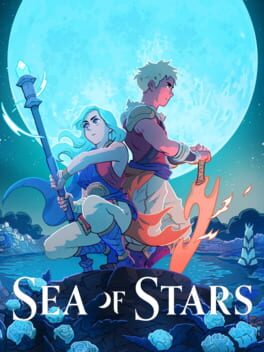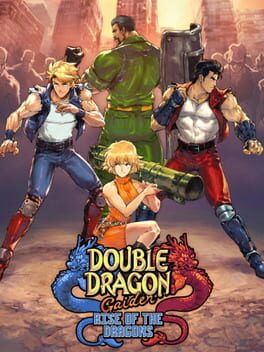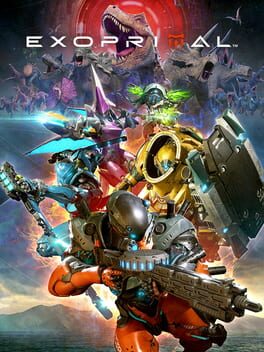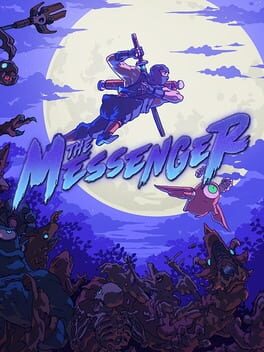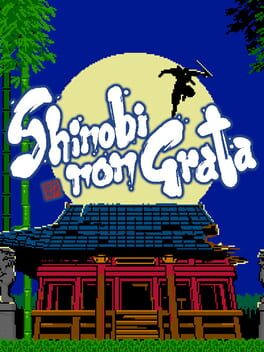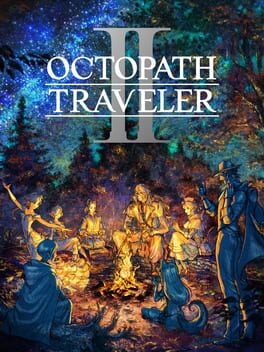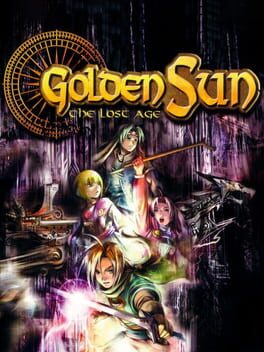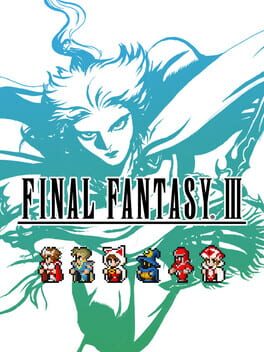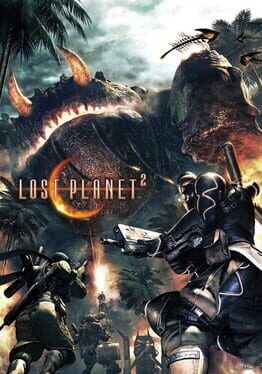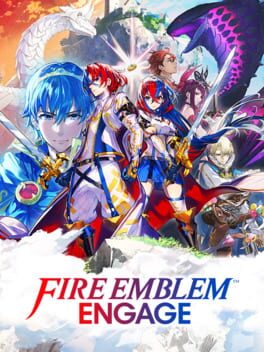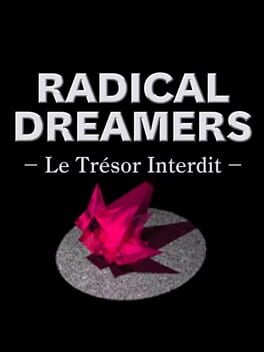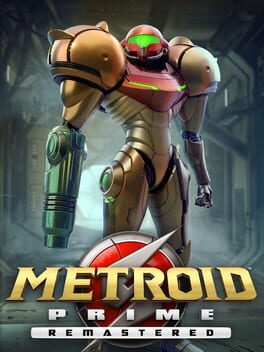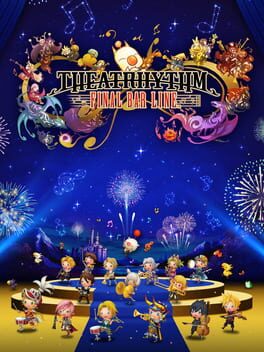ArrenSol
2023
I'll lead off with this: I truly did enjoy Sea of Stars. Sabotage Studios put together a competent, downright gorgeous RPG on a dime, an incredible feat in itself for a studio whose prior project was very much detached from the genre.
In some ways, their history is pretty clear -- SoS doesn't do a ton of innovating in its 25-ish hour runtime -- but it still shows a pretty solid understanding of the building blocks of the classical console RPG in its execution. Combat is crispy and encounters run pretty quick (despite the lack of a 'flee' option), exploration is an easy highlight punctuated by how free-flowing traversal is, and its soundtrack has some great earworms and guest tracks from industry legend Yasunori Mitsuda to boot. For the most part, the gameplay loop is also paced pretty well -- dungeons and zones never really run on for too long and there's a solid mix of puzzles and fights to keep players engaged. Some fights even feel like puzzles, thanks to the "locks" system (players can interrupt the occasional enemy action by breaking a series of locks a la Octopath Traveler), combo attacks, and turn delays.
Sea undeniably feels pretty good to play from moment to moment, but the general long haul vibe of an RPG sometimes works to its detriment. There is very little out-of-battle character building to focus on, minimal customization (toggleable relics and some accessories slightly modify how the game is played), and the full party's individual skills cap out at a paltry 4 each, including an ultimate ability that very rarely gets used outside of boss fights. These particular points might leave more seasoned RPG enjoyers left wanting, and at times I did feel like the cycle of [collect new stat stick -> level up a couple times -> use the same moves to clear trash mobs] wore on me, but I can definitely see it all working well as a surface-level examination of the genre.
That said, surface-level is a pretty common feeling throughout; Sabotage's latest ticks a bunch of the boxes that I think made some of those classic adventures charming, but with a bit less gameplay grit and an English script that could've used another editing pass and some grammatical polish. There are still surprises sprinkled across Zale and Valere's journey to become guardians of their world, and I did find some moments genuinely affecting, but too often does Sea fumble about trying to get its cast moving along to the next major story beat. For better or worse, though, most of this happens in the early hours -- once the 4th party member joins, a couple new layers of intrigue get added to the plot and some of the less enjoyable main-side-quest aspects start washing away. A sequence around the midpoint of the game in particular was pretty spectacular.
Ultimately, I think Sea of Stars is quite memorable, for both its triumphs and its shortfalls -- as a highly successful kickstarter project it already had some big shoes to fill -- but I could definitely see myself recommending it to folks who are looking for something with a few modern touches that isn't overly complex. There's a demo available that I think does a pretty good job of showing off the overall vibe, so give it a look if you're interested.
In some ways, their history is pretty clear -- SoS doesn't do a ton of innovating in its 25-ish hour runtime -- but it still shows a pretty solid understanding of the building blocks of the classical console RPG in its execution. Combat is crispy and encounters run pretty quick (despite the lack of a 'flee' option), exploration is an easy highlight punctuated by how free-flowing traversal is, and its soundtrack has some great earworms and guest tracks from industry legend Yasunori Mitsuda to boot. For the most part, the gameplay loop is also paced pretty well -- dungeons and zones never really run on for too long and there's a solid mix of puzzles and fights to keep players engaged. Some fights even feel like puzzles, thanks to the "locks" system (players can interrupt the occasional enemy action by breaking a series of locks a la Octopath Traveler), combo attacks, and turn delays.
Sea undeniably feels pretty good to play from moment to moment, but the general long haul vibe of an RPG sometimes works to its detriment. There is very little out-of-battle character building to focus on, minimal customization (toggleable relics and some accessories slightly modify how the game is played), and the full party's individual skills cap out at a paltry 4 each, including an ultimate ability that very rarely gets used outside of boss fights. These particular points might leave more seasoned RPG enjoyers left wanting, and at times I did feel like the cycle of [collect new stat stick -> level up a couple times -> use the same moves to clear trash mobs] wore on me, but I can definitely see it all working well as a surface-level examination of the genre.
That said, surface-level is a pretty common feeling throughout; Sabotage's latest ticks a bunch of the boxes that I think made some of those classic adventures charming, but with a bit less gameplay grit and an English script that could've used another editing pass and some grammatical polish. There are still surprises sprinkled across Zale and Valere's journey to become guardians of their world, and I did find some moments genuinely affecting, but too often does Sea fumble about trying to get its cast moving along to the next major story beat. For better or worse, though, most of this happens in the early hours -- once the 4th party member joins, a couple new layers of intrigue get added to the plot and some of the less enjoyable main-side-quest aspects start washing away. A sequence around the midpoint of the game in particular was pretty spectacular.
Ultimately, I think Sea of Stars is quite memorable, for both its triumphs and its shortfalls -- as a highly successful kickstarter project it already had some big shoes to fill -- but I could definitely see myself recommending it to folks who are looking for something with a few modern touches that isn't overly complex. There's a demo available that I think does a pretty good job of showing off the overall vibe, so give it a look if you're interested.
The boys are back in town!! (sunglasses emoji)
Perhaps a touch hyperbolic, but Rise of the Dragons really embodies what I think is the future of the Arcadey Beat-Em-Up. In lieu of a proper write up I'll list out some pros and cons for a quick glance:
---------PROS---------
+ Very straightforward, pick-up-and-play combat with a surprising amount of nuance and tech (CC, cancels, tag specials, upgrades)
+ Sizable amount of varied characters to choose from
+ Modular difficulty options that allow players to tailor to their preferences
+ Cool Tunes
+ Dynamic progression (upgrades, stages)
---------TAKE IT OR LEAVE IT---------
+/- Roguelike structure (no progress saved, no permanent character growth)
+/- Chibi art style reminiscent of other beat-em-ups
---------CONS---------
- Late-game boss variants can feel pretty unfair
- Only 5 stages
- No online
- Some characters take a long time to unlock
All in all, a ton of steps in the right direction for the genre. I'm a big fan of the stage progression in particular; clearing stages raises the threat level in subsequent zones, leading to additional areas and boss variants. For a game that on the surface looks very short, it's key that there's some reason to revisit and try different sequencing, and stages are snappy enough that the "just one more" mentality has a chance to win out. Not what I'd call perfect but so easy to fire up for a couple plays at a time.
Perhaps a touch hyperbolic, but Rise of the Dragons really embodies what I think is the future of the Arcadey Beat-Em-Up. In lieu of a proper write up I'll list out some pros and cons for a quick glance:
---------PROS---------
+ Very straightforward, pick-up-and-play combat with a surprising amount of nuance and tech (CC, cancels, tag specials, upgrades)
+ Sizable amount of varied characters to choose from
+ Modular difficulty options that allow players to tailor to their preferences
+ Cool Tunes
+ Dynamic progression (upgrades, stages)
---------TAKE IT OR LEAVE IT---------
+/- Roguelike structure (no progress saved, no permanent character growth)
+/- Chibi art style reminiscent of other beat-em-ups
---------CONS---------
- Late-game boss variants can feel pretty unfair
- Only 5 stages
- No online
- Some characters take a long time to unlock
All in all, a ton of steps in the right direction for the genre. I'm a big fan of the stage progression in particular; clearing stages raises the threat level in subsequent zones, leading to additional areas and boss variants. For a game that on the surface looks very short, it's key that there's some reason to revisit and try different sequencing, and stages are snappy enough that the "just one more" mentality has a chance to win out. Not what I'd call perfect but so easy to fire up for a couple plays at a time.
2023
Exoprimal is fun, frantic, absolutely off-the-wall bonkers and full of a confidence that's surprisingly not misplaced. I went into the game sold on the sci-fi PvE robots vs. dinosaur premise -- if just a little cheeky about it -- but I was surprised at how smoothly it handles its content.
It certainly reads and looks like the video game equivalent of shotgunning an energy drink, but after playing some it becomes quite clear that the game was definitely put together function-before-form. The core loop involves queueing up for matches, where you race against another team to defeat wave after wave of angry dinos before a head-to-head finale where initial advantage is determined by how well your team completed the opening phase. Completing matches progresses the story, which is revealed piecemeal via small vignettes, data logs, radio cuts, etc. and unlocks some new mission types, including some surprises in the form of 10-player cooperative raid bosses a la Monster Hunter, where chaos is really allowed to flourish. The action, gunplay, and skill sets all feel reasonably diverse even with only a handful of available exosuits at launch, and Capcom miraculously struck a balance between making players feel beastly during the dino battles and keeping PvP seeming fair.
It doesn't have a streamlined campaign quite in the way that, say, Lost Planet 2 does, opting for a completely off-the-rails story about the dangers of unchecked capitalism and AI (surprisingly relevant for what it is). Unfortunately, its initial purpose definitely feels like a clumsy impetus to get players queuin' up, which puts it in sort of a weird middle ground that admittedly may be a bit off-putting to people looking for a more curated experience -- some might not want to grind semi-competitive matches just to see story, some might not want to see story at all and feel bottlenecked by having a bunch of cutscenes and data to skip over. That said, I definitely see it as an intentional middle ground (even the repeated match queueing is "written into" the story under the guise of data collection!) rather than a game suffering from an identity crisis. A generous read, perhaps, but to be completely honest I can totally imagine Overwatch 2's now-cancelled campaign to have resembled this.
Having really loved Exoprimal, I do have some concern for its future; crossplay is limited to matchmaking only, so it's impossible to round up friends from across the game's numerous available platforms for matches (everyone's gotta be in the same ecosystem) and content updates have been entertaining but sparse. I'm really hoping that even as content starts to wind down (whenever that is) sales and the like will help breathe life into the game whenever possible. Definitely recommend it to anybody who's looking for some wacky, noncommittal fun in a shooter.
It certainly reads and looks like the video game equivalent of shotgunning an energy drink, but after playing some it becomes quite clear that the game was definitely put together function-before-form. The core loop involves queueing up for matches, where you race against another team to defeat wave after wave of angry dinos before a head-to-head finale where initial advantage is determined by how well your team completed the opening phase. Completing matches progresses the story, which is revealed piecemeal via small vignettes, data logs, radio cuts, etc. and unlocks some new mission types, including some surprises in the form of 10-player cooperative raid bosses a la Monster Hunter, where chaos is really allowed to flourish. The action, gunplay, and skill sets all feel reasonably diverse even with only a handful of available exosuits at launch, and Capcom miraculously struck a balance between making players feel beastly during the dino battles and keeping PvP seeming fair.
It doesn't have a streamlined campaign quite in the way that, say, Lost Planet 2 does, opting for a completely off-the-rails story about the dangers of unchecked capitalism and AI (surprisingly relevant for what it is). Unfortunately, its initial purpose definitely feels like a clumsy impetus to get players queuin' up, which puts it in sort of a weird middle ground that admittedly may be a bit off-putting to people looking for a more curated experience -- some might not want to grind semi-competitive matches just to see story, some might not want to see story at all and feel bottlenecked by having a bunch of cutscenes and data to skip over. That said, I definitely see it as an intentional middle ground (even the repeated match queueing is "written into" the story under the guise of data collection!) rather than a game suffering from an identity crisis. A generous read, perhaps, but to be completely honest I can totally imagine Overwatch 2's now-cancelled campaign to have resembled this.
Having really loved Exoprimal, I do have some concern for its future; crossplay is limited to matchmaking only, so it's impossible to round up friends from across the game's numerous available platforms for matches (everyone's gotta be in the same ecosystem) and content updates have been entertaining but sparse. I'm really hoping that even as content starts to wind down (whenever that is) sales and the like will help breathe life into the game whenever possible. Definitely recommend it to anybody who's looking for some wacky, noncommittal fun in a shooter.
2018
I really wanted to talk something about the weight of expectations as a lead-in to a proper recap of The Messenger, but I'm a couple months late to recording my thoughts on my playthrough, so instead I'm just putting together a pretty quick "I liked it" post for posterity.
It's a good, cheeky, fun action game with some incredible schmovement, intense bosses and a few really cool twists and turns. Action is snappy and there's a point where the game shifts gears into something I really wasn't expecting that bumped my opinion of it considerably. Incredibly natural in its progression, clearly crafted by a team who adores platforming greats of the 90s (it's no secret that the lead dev was heavily inspired by Ninja Gaiden), and not without some pretty dastardly (if optional) challenges. It's all punctuated by stunning 2D environments and an OST-of-the-year caliber soundtrack from rainbowdragoneyes.
I think perhaps the biggest point in The Messenger's favor to me, though, is its beating heart. It's probably a bit much for folks who are weary of the action-comedy-as-a-construct, often dipping into meta-humor and dialogue I'd refer to as juvenile (though not crude), but it does so with sincerity. Of course you could argue that sincerity does not an entertaining game make, but everything else in the game is crafted with such purpose it's really hard for me NOT to give the dialogue the benefit of the doubt and just roll with it for the sake of, I don't know, vibing with the vision. (Now I'm ranting about intangibles.) Anyway, it's a very imaginative adventure that's been rolling around in its creator's mind for eons, and even if I had some faults with dialogue here and there it's a pretty inconsequential part of an intriguing setting and story.
It's really not to be missed if you're AT WORST tolerant of some pretty tough gameplay -- you may end up spending a ton of time trying to hash out a boss fight or nail tricky platforming sequences -- but could be a harder sell if a lot of the trial and error isn't quite your thing. Even still, it's pretty forgiving about its checkpointing, so a little perseverance will see you through the critical path before too long.
tl;dr an excellent, robust indie game with a lot of style and substance to match.
It's a good, cheeky, fun action game with some incredible schmovement, intense bosses and a few really cool twists and turns. Action is snappy and there's a point where the game shifts gears into something I really wasn't expecting that bumped my opinion of it considerably. Incredibly natural in its progression, clearly crafted by a team who adores platforming greats of the 90s (it's no secret that the lead dev was heavily inspired by Ninja Gaiden), and not without some pretty dastardly (if optional) challenges. It's all punctuated by stunning 2D environments and an OST-of-the-year caliber soundtrack from rainbowdragoneyes.
I think perhaps the biggest point in The Messenger's favor to me, though, is its beating heart. It's probably a bit much for folks who are weary of the action-comedy-as-a-construct, often dipping into meta-humor and dialogue I'd refer to as juvenile (though not crude), but it does so with sincerity. Of course you could argue that sincerity does not an entertaining game make, but everything else in the game is crafted with such purpose it's really hard for me NOT to give the dialogue the benefit of the doubt and just roll with it for the sake of, I don't know, vibing with the vision. (Now I'm ranting about intangibles.) Anyway, it's a very imaginative adventure that's been rolling around in its creator's mind for eons, and even if I had some faults with dialogue here and there it's a pretty inconsequential part of an intriguing setting and story.
It's really not to be missed if you're AT WORST tolerant of some pretty tough gameplay -- you may end up spending a ton of time trying to hash out a boss fight or nail tricky platforming sequences -- but could be a harder sell if a lot of the trial and error isn't quite your thing. Even still, it's pretty forgiving about its checkpointing, so a little perseverance will see you through the critical path before too long.
tl;dr an excellent, robust indie game with a lot of style and substance to match.
2023
A delightful action game pretty well in-line with NES classics like Demon Sword, but with a much tighter structure and some incredible pixel art and music. As a first play, I did encounter a few stages and fights that tested my reflexes, really emphasizing that the arcade-style experience leads to a lot of the game's value. Full-scale replays, digging into patterns and placements, and finding the best ninja tools for every situation seem to be the main appeal; the game seems poised for speed/challenge runs where the only real motivation to keep playing is to get good.
SNG is quite short and sweet, clocking in around maybe 4-5 hours (less if you're Good At Video Games), but worth the price of admission for the detailed aesthetic and banger tunes alone. Very similar to Steel Assault in the "big things in small packages" vibes. Pretty easy recommend if stuff like the aforementioned, or even Metal Slug/Contra/Megaman are your jam.
SNG is quite short and sweet, clocking in around maybe 4-5 hours (less if you're Good At Video Games), but worth the price of admission for the detailed aesthetic and banger tunes alone. Very similar to Steel Assault in the "big things in small packages" vibes. Pretty easy recommend if stuff like the aforementioned, or even Metal Slug/Contra/Megaman are your jam.
2023
I'm still not really sure what possessed me to go all-in on Octopath Traveler II. Team Asano's 2018 outing felt like a miss to me; among a slew of complaints about OT1's mechanics feeling half-baked and Team Asano's now-signature HD2D look not quite finding its footing, its very loosely connected plot and minimal character interactivity felt like a waste of a wonderful setting and good characters and left me lukewarm on the possibility of more Octopath. As it'd turn out, it's always darkest...
Flash forward a bit: Team Asano's much-praised LIVE A LIVE remake (I've had some choice words to say about it here on backloggd) went WAY over on me while raising questions. "If this existed before, why did Octopath feel like a step back?" The blueprint was right there! LAL didn't even play around with the pretense of needing the characters to all be in the same region -- without spoiling much, characters' connectivity felt thematic and driven by a late-game plot event -- and the way things came together legitimately felt like a surprise. My faith restored, even if only in part, I figured the team could learn from both longstanding criticisms of OT while looking toward a game like LIVE A LIVE to draw some inspiration. With that in mind, I decided to give Octopath Traveler II a tentative go.
I came out of it feeling vindicated for taking a leap; Octopath Traveler II is everything its predecessor couldn't be. Although it doesn't change much of its series core DNA -- you're still playing through 8 different narratives, combat is largely untouched save for a couple new bells and whistles, the music still absolutely rocks -- II massively improves on many of the weak points presented by the original. Characters' stories now sprinkle some breadcrumbs hinting at an overarching narrative, the cast now acknowledges each other more frequently (even in battle!), and perhaps most importantly, a few joint chapters and skits throughout the game give some of the main cast an opportunity to bond and lean on each other's strengths to solve problems and uncover truths of their world in a way that doesn't feel cobbled together and inelegant. They really did it.
Of course, I do have my squabbles. Exploration feels very dioramic; although the world is "open", for lack of a better term, nearly every field and dungeon lays its cards out on the table with a minimap/radar highlighting points of interest for players to simply sprint over to without a second thought. It does work for some highly "Point-A-to-Point-B" gaming -- I lovingly referred to it more than once as a "blue collar RPG" -- but it's the sort of inorganic lean that really does turn the moments between into box-ticking with some turn-based combat sprinkled in. Personal actions are very similar in that regard, making every town a checklist of NPCs to harass for info, hidden treasures, skills, and so forth. The world of Solistia is teeming with a ton of essentially non-essential lore revealed by using these actions, though; every town feels like Value Town. This focus on details permeates through other portions of the game, too, with some incredibly well-planned moments even revolving around integrating character abilities directly into plot progression.
Character stories are largely better in II (Agnea's and Partitio's were personal favorites), though it was a bit strange that the scenario team still hasn't quite nailed how to put the cast in situations that at least consider the presence of party members, be it through a couple extra lines of optional dialogue or even a slight deviation in how a chapter plays out. Still, it's a monumental step above OT, even moreso emphasized by a jaw-dropping final chapter that felt like it was crafted specifically to address everything I thought the first game missed out on.
Octopath II sticks its landing cleaner than I thought it would. Really, I think the only place it DOESN'T far outstrip its predecessor is its music...but even that isn't because of a dip in quality, I just thought OT1's soundtrack was that good. By the time credits rolled, I had been moved and entertained in ways that OT hadn't compelled me to be, making this one a huge bright spot in my recent gaming landscape and a worthy GOTY candidate. Go into this one with confidence if you love and appreciate modern craftsmanship and classic RPGs.
Flash forward a bit: Team Asano's much-praised LIVE A LIVE remake (I've had some choice words to say about it here on backloggd) went WAY over on me while raising questions. "If this existed before, why did Octopath feel like a step back?" The blueprint was right there! LAL didn't even play around with the pretense of needing the characters to all be in the same region -- without spoiling much, characters' connectivity felt thematic and driven by a late-game plot event -- and the way things came together legitimately felt like a surprise. My faith restored, even if only in part, I figured the team could learn from both longstanding criticisms of OT while looking toward a game like LIVE A LIVE to draw some inspiration. With that in mind, I decided to give Octopath Traveler II a tentative go.
I came out of it feeling vindicated for taking a leap; Octopath Traveler II is everything its predecessor couldn't be. Although it doesn't change much of its series core DNA -- you're still playing through 8 different narratives, combat is largely untouched save for a couple new bells and whistles, the music still absolutely rocks -- II massively improves on many of the weak points presented by the original. Characters' stories now sprinkle some breadcrumbs hinting at an overarching narrative, the cast now acknowledges each other more frequently (even in battle!), and perhaps most importantly, a few joint chapters and skits throughout the game give some of the main cast an opportunity to bond and lean on each other's strengths to solve problems and uncover truths of their world in a way that doesn't feel cobbled together and inelegant. They really did it.
Of course, I do have my squabbles. Exploration feels very dioramic; although the world is "open", for lack of a better term, nearly every field and dungeon lays its cards out on the table with a minimap/radar highlighting points of interest for players to simply sprint over to without a second thought. It does work for some highly "Point-A-to-Point-B" gaming -- I lovingly referred to it more than once as a "blue collar RPG" -- but it's the sort of inorganic lean that really does turn the moments between into box-ticking with some turn-based combat sprinkled in. Personal actions are very similar in that regard, making every town a checklist of NPCs to harass for info, hidden treasures, skills, and so forth. The world of Solistia is teeming with a ton of essentially non-essential lore revealed by using these actions, though; every town feels like Value Town. This focus on details permeates through other portions of the game, too, with some incredibly well-planned moments even revolving around integrating character abilities directly into plot progression.
Character stories are largely better in II (Agnea's and Partitio's were personal favorites), though it was a bit strange that the scenario team still hasn't quite nailed how to put the cast in situations that at least consider the presence of party members, be it through a couple extra lines of optional dialogue or even a slight deviation in how a chapter plays out. Still, it's a monumental step above OT, even moreso emphasized by a jaw-dropping final chapter that felt like it was crafted specifically to address everything I thought the first game missed out on.
Octopath II sticks its landing cleaner than I thought it would. Really, I think the only place it DOESN'T far outstrip its predecessor is its music...but even that isn't because of a dip in quality, I just thought OT1's soundtrack was that good. By the time credits rolled, I had been moved and entertained in ways that OT hadn't compelled me to be, making this one a huge bright spot in my recent gaming landscape and a worthy GOTY candidate. Go into this one with confidence if you love and appreciate modern craftsmanship and classic RPGs.
After my second "proper" way through this game, I feel a lot better in general about its systems than I did the first go-around...and I didn't even dislike them to begin with!
Truly an excellent game that manages to channel the spirit of the series' first instalment while feeling altogether new. I have my share of superficial nitpicks about Breath of the Wild, both in 2017 and in 2023 (having all your toys at the onset and never being gated by new tools being a blessing and a curse, truncated dungeon/setpiece sequences), but none of them really stood in the way of me and a good time.
Something that always stuck out to me was how friendly the game is about letting players solve problems their way. My second playthrough was SIGNIFICANTLY different from my first, and not necessarily just because I walked a different route (or because I played entirely with the base 3 hearts). BOTW inspires creativity in problem solving in a way that previous Zelda games simply didn't accommodate for in their design, something I sincerely hope carries over into Tears of the Kingdom. From the very early looks we've had, it seems likely that's the case.
Truly an excellent game that manages to channel the spirit of the series' first instalment while feeling altogether new. I have my share of superficial nitpicks about Breath of the Wild, both in 2017 and in 2023 (having all your toys at the onset and never being gated by new tools being a blessing and a curse, truncated dungeon/setpiece sequences), but none of them really stood in the way of me and a good time.
Something that always stuck out to me was how friendly the game is about letting players solve problems their way. My second playthrough was SIGNIFICANTLY different from my first, and not necessarily just because I walked a different route (or because I played entirely with the base 3 hearts). BOTW inspires creativity in problem solving in a way that previous Zelda games simply didn't accommodate for in their design, something I sincerely hope carries over into Tears of the Kingdom. From the very early looks we've had, it seems likely that's the case.
Even after all these years it's still baffling to me that Camelot was able to fit SO much onto a GBA cartridge. TLA, even moreso than its predecessor, is a technical marvel on merits of its scale alone.
Still, that ends up being something of a double-edged sword. Dungeons tend to run on the long side and don't have any in-game maps, and rooms often have to be retreaded just to do one or two small tasks ad infinitum, and many don't even have a payoff boss to cap the experience off. Combined with the GBA's already miniscule screen space, these elements make it a bit ill-suited for the same style of pick-up-and-play that made even Golden Sun so appealing as a handheld RPG.
At least the added depth makes for a much grander back half of the saga. Felix and co.'s journey around the world feels leaps beyond the first game's narrative foundations, both in weight and in spectacle, so it's easy to forgive some of the slower segments in favor of some solid story and worldbuilding payoffs. It's also surprisingly crispy on the gameplay side, with tons of stuff to collect, excellent visuals and fast-flowing turn-based combat.
Overall I strongly prefer this to the first game and appreciate playing through it every now and again. Just wish dungeons took a little less of this game's time in favor of bosses/setpieces.
Still, that ends up being something of a double-edged sword. Dungeons tend to run on the long side and don't have any in-game maps, and rooms often have to be retreaded just to do one or two small tasks ad infinitum, and many don't even have a payoff boss to cap the experience off. Combined with the GBA's already miniscule screen space, these elements make it a bit ill-suited for the same style of pick-up-and-play that made even Golden Sun so appealing as a handheld RPG.
At least the added depth makes for a much grander back half of the saga. Felix and co.'s journey around the world feels leaps beyond the first game's narrative foundations, both in weight and in spectacle, so it's easy to forgive some of the slower segments in favor of some solid story and worldbuilding payoffs. It's also surprisingly crispy on the gameplay side, with tons of stuff to collect, excellent visuals and fast-flowing turn-based combat.
Overall I strongly prefer this to the first game and appreciate playing through it every now and again. Just wish dungeons took a little less of this game's time in favor of bosses/setpieces.
2021
What started as just poking around at the beginning of one of my beloved classics kinda spiraled into an all-day cleanup, and it's all thanks to the recent Pixel Remaster console releases. Boosts in particular are a godsend; grinding in games like FFIII has never been difficult, so the ability to jack up exp rates and gain a crucial level or two on the fly is a very welcome addition to an already-snappy Pixel Remaster flow.
Mechanically, I think FFIII PR is the easiest pick of the FFIII litter; a lot of the difficulty of both the NES and DS versions has been scaled back, an observation that seems to be pretty common across every FF Pixel Remaster (even without boosts). Simply keeping pace with gear and random battles (i.e. not running in circles) means most bosses won't be especially threatening outside of the final gauntlet, although the optional bosses still have some bite with powerful full-party attacks. Overall III is a bit more complex in encounter design than its predecessors, featuring some bosses and even random encounters with unique mechanics (Hein and Amon, enemies in the Cave of Shadows), but the wide majority of battles are trivialized by towing a healer along for the ride.
I think ultimately that's where FF III (and the NES era in general) falls a bit short for me; even if I have an unreasonable love of this game that hasn't been whittled down by rereleases, I can still see the forest for the trees. That said, it helps that the trees this time look and sound pretty damn nice! The console PR's option to toggle between a couple of font styles, classic chiptune soundtracks and new arrangements allows for a little bit more of a tailored experience than its forebears without invalidating their presence.
There is no one "definitive" version of Final Fantasy III to play, and I think that's for the best, but for nostalgia's sake or to get a quick rundown of what you may have missed in the past, FFIII PR is great and very easy on your time to boot.
Mechanically, I think FFIII PR is the easiest pick of the FFIII litter; a lot of the difficulty of both the NES and DS versions has been scaled back, an observation that seems to be pretty common across every FF Pixel Remaster (even without boosts). Simply keeping pace with gear and random battles (i.e. not running in circles) means most bosses won't be especially threatening outside of the final gauntlet, although the optional bosses still have some bite with powerful full-party attacks. Overall III is a bit more complex in encounter design than its predecessors, featuring some bosses and even random encounters with unique mechanics (Hein and Amon, enemies in the Cave of Shadows), but the wide majority of battles are trivialized by towing a healer along for the ride.
I think ultimately that's where FF III (and the NES era in general) falls a bit short for me; even if I have an unreasonable love of this game that hasn't been whittled down by rereleases, I can still see the forest for the trees. That said, it helps that the trees this time look and sound pretty damn nice! The console PR's option to toggle between a couple of font styles, classic chiptune soundtracks and new arrangements allows for a little bit more of a tailored experience than its forebears without invalidating their presence.
There is no one "definitive" version of Final Fantasy III to play, and I think that's for the best, but for nostalgia's sake or to get a quick rundown of what you may have missed in the past, FFIII PR is great and very easy on your time to boot.
2010
[Completed Campaign on Hard]
I don't have entirely too much to say about Lost Planet as a franchise -- 3 was entirely too bland for me and I never did get a proper playthrough of 1 in the books -- but LP2 is an undeniably fun action-flick of a video game with a fair bit of replayability and some A+ setpieces.
The replay, after 10 years, didn't really change too much for me. Controls still ricochet between "schmovement-friendly" and "big rig driving", the overarching story is mostly throwaway with little substance (though the individual episode stories can be pretty entertaining) and stages themselves are paced kinda awkwardly outside of the big spectacle boss fights.
I know it sounds like maybe I've gotten off to kind of a rough start with this description, but it definitely doesn't end the way you might think it would. Gunplay is fantastic, aforementioned boss fights are top-notch, as is Capcom's wont, and the visuals/sound design both hold up even after a decade and change.
Really one of the few dealbreakers that might be present for folks nowadays is the ubiquity of loot boxes in the game; reader be reassured, they aren't monetary by literally any possible means, but a lot of the game's unlockables (even the ability to use different starting weapons in campaign and multiplayer) are gated behind collecting these off boss drops and other miscellaneous foes. You really can't take the MH outta Capcom or whatever.
Find a fix for this game, pick it up for whatever 3-5 dollars you can find it at nowadays (it's been delisted from Steam but well still available on sites that sell codes on the cheap), convince a few friends to slap the campaign mode around with you, and you're in for a couple days worth of campaign fun alone.
I don't have entirely too much to say about Lost Planet as a franchise -- 3 was entirely too bland for me and I never did get a proper playthrough of 1 in the books -- but LP2 is an undeniably fun action-flick of a video game with a fair bit of replayability and some A+ setpieces.
The replay, after 10 years, didn't really change too much for me. Controls still ricochet between "schmovement-friendly" and "big rig driving", the overarching story is mostly throwaway with little substance (though the individual episode stories can be pretty entertaining) and stages themselves are paced kinda awkwardly outside of the big spectacle boss fights.
I know it sounds like maybe I've gotten off to kind of a rough start with this description, but it definitely doesn't end the way you might think it would. Gunplay is fantastic, aforementioned boss fights are top-notch, as is Capcom's wont, and the visuals/sound design both hold up even after a decade and change.
Really one of the few dealbreakers that might be present for folks nowadays is the ubiquity of loot boxes in the game; reader be reassured, they aren't monetary by literally any possible means, but a lot of the game's unlockables (even the ability to use different starting weapons in campaign and multiplayer) are gated behind collecting these off boss drops and other miscellaneous foes. You really can't take the MH outta Capcom or whatever.
Find a fix for this game, pick it up for whatever 3-5 dollars you can find it at nowadays (it's been delisted from Steam but well still available on sites that sell codes on the cheap), convince a few friends to slap the campaign mode around with you, and you're in for a couple days worth of campaign fun alone.
Generally speaking I don't really think my takes on Sekiro are at all controversial, nor are they novel or even new, so I'll just go ahead and start this the same way I started this most recent playthrough:
I originally gave Sekiro a try back in March 2019, shortly after its release, because I was so enamored with From Software taking a step away from their signature grimdark high western fantasy look that I didn't care what the game would actually play like. For some reason or another (I likely just wasn't focused on it, trying to juggle a billion games like I normally do) I dropped off it, seemingly never to return...but hey, I guess playthroughs also die twice. What awaited me, nearly four years after its initial release, was a truly engaging and fun ninja romp that (surprisingly) basically never left me furious.
There's a core reason for that, too. Despite feeling like Sekiro is pretty unforgiving, there's a significant clarity to what's getting you at any given time. Tried to deflect a grab? Tried to jump a stab attack? Tried to fight 3 ass-kicking monks because you think you're above ninja rules? Get back in line, baby! Sekiro makes no pretense about making you play the game the way it wants you to -- even though you can definitely get around that and there's some pretty clear cheese strats even for bosses -- and its encounter design is incredibly rigid but not in a way that feels personally grating. It's all patterns, guard routines, quick kills and shortcuts, and figuring out how to either take an encounter head on or circumvent conflict is an incredibly rewarding experience best highlighted by (at minimum) a second playthrough of the main game.
Thankfully, there's much to see outside of an organic first play. Areas I didn't know existed, skills to be bought, and much more that you wouldn't get on the first go-around, including multiple endings drove me to a second playthrough only a day removed from my triumphant first clear. It's surprisingly well-paced from a narrative perspective, too, and much more forward about story's place in the overall package than FromSoft's typical fare (compare to the DS series' excellent reliance on environmental storytelling).
I think the only thing that didn't really leave an impression on me was the game's music. I totally understand that the vibe skews theatrical, and instrumentation aligns itself perfectly with the aesthetic, but it's just not the kind of OST I'd listen to on its own and I feel like that factors in somehow. Really though, if that's all that I can say even veering negative I think it's pretty fair to say this game is every bit as good as people seem to say it is.
I originally gave Sekiro a try back in March 2019, shortly after its release, because I was so enamored with From Software taking a step away from their signature grimdark high western fantasy look that I didn't care what the game would actually play like. For some reason or another (I likely just wasn't focused on it, trying to juggle a billion games like I normally do) I dropped off it, seemingly never to return...but hey, I guess playthroughs also die twice. What awaited me, nearly four years after its initial release, was a truly engaging and fun ninja romp that (surprisingly) basically never left me furious.
There's a core reason for that, too. Despite feeling like Sekiro is pretty unforgiving, there's a significant clarity to what's getting you at any given time. Tried to deflect a grab? Tried to jump a stab attack? Tried to fight 3 ass-kicking monks because you think you're above ninja rules? Get back in line, baby! Sekiro makes no pretense about making you play the game the way it wants you to -- even though you can definitely get around that and there's some pretty clear cheese strats even for bosses -- and its encounter design is incredibly rigid but not in a way that feels personally grating. It's all patterns, guard routines, quick kills and shortcuts, and figuring out how to either take an encounter head on or circumvent conflict is an incredibly rewarding experience best highlighted by (at minimum) a second playthrough of the main game.
Thankfully, there's much to see outside of an organic first play. Areas I didn't know existed, skills to be bought, and much more that you wouldn't get on the first go-around, including multiple endings drove me to a second playthrough only a day removed from my triumphant first clear. It's surprisingly well-paced from a narrative perspective, too, and much more forward about story's place in the overall package than FromSoft's typical fare (compare to the DS series' excellent reliance on environmental storytelling).
I think the only thing that didn't really leave an impression on me was the game's music. I totally understand that the vibe skews theatrical, and instrumentation aligns itself perfectly with the aesthetic, but it's just not the kind of OST I'd listen to on its own and I feel like that factors in somehow. Really though, if that's all that I can say even veering negative I think it's pretty fair to say this game is every bit as good as people seem to say it is.
2023
Look, I'm gonna preface this by saying that, tl;dr, I really enjoyed Fire Emblem Engage! If you're a gameplay-first SRPG enthusiast, or just keen on some excellent music and stellar visuals, this one could be for you!
That said, I feel like your capacity for this game will depend largely on your tolerance for paper-thin plot and saccharine (over)designed characters, of which this game has many. The plot is far from its namesake, a glorified excuse to slap together series protagonists for some good ol-fashioned campy anime whoop-ass. It's got a couple fun moments that don't specifically rely on series callbacks to feel cool, but the overall tone is a massive departure from typical Emblem fare. Although past FE games aren't exceptionally doom-and-gloom, this feels like the dial turned all the way over; some key moments still do their job, but it's mostly lighthearted and doesn't really feel like it -- or its cast -- has a whole lot "to say".
And ultimately, for me, that was okay. The gameplay, visuals and music carry this one. If anything has me excited for the future of Fire Emblem after Engage, it's how well-formed the core gameplay is; Emblem Rings as sort of sub-jobs, skill inheritance for extra mix and match, and (this one's a bit superficial) characters actually moving on the overworld as I direct them all went a long way to keep me motivated. Post-game activities include extra "arcade mode"-style maps for souping up special weaponry, co-op relay trials, and even a mode that lets you build a defense base and try to invade others' creations -- all ideas that took some inspiration from Heroes -- great implementations for a console Emblem. If you're really feeling the strategic gameplay and just want a playground to let loose with some superpowered characters there's a fair bit of extra space to work with.
Engage's presentation is impressive, with rich backgrounds and animations, varied environments and an infectious soundtrack punctuated by the series now-signature dynamic map music. The main non-vocal themes are exciting and catchy, with some great use of the main motif, and the game's sidequests include wonderful arrangements of some Fire Emblem classics. There's a lot to like here.
Engage is a fine game when you take it for what it is -- a big birthday party where all the main heroes from across its history are invited -- but folks probably won't be excited if they're more attuned to old FE or even something more involved like 3H.
That said, I feel like your capacity for this game will depend largely on your tolerance for paper-thin plot and saccharine (over)designed characters, of which this game has many. The plot is far from its namesake, a glorified excuse to slap together series protagonists for some good ol-fashioned campy anime whoop-ass. It's got a couple fun moments that don't specifically rely on series callbacks to feel cool, but the overall tone is a massive departure from typical Emblem fare. Although past FE games aren't exceptionally doom-and-gloom, this feels like the dial turned all the way over; some key moments still do their job, but it's mostly lighthearted and doesn't really feel like it -- or its cast -- has a whole lot "to say".
And ultimately, for me, that was okay. The gameplay, visuals and music carry this one. If anything has me excited for the future of Fire Emblem after Engage, it's how well-formed the core gameplay is; Emblem Rings as sort of sub-jobs, skill inheritance for extra mix and match, and (this one's a bit superficial) characters actually moving on the overworld as I direct them all went a long way to keep me motivated. Post-game activities include extra "arcade mode"-style maps for souping up special weaponry, co-op relay trials, and even a mode that lets you build a defense base and try to invade others' creations -- all ideas that took some inspiration from Heroes -- great implementations for a console Emblem. If you're really feeling the strategic gameplay and just want a playground to let loose with some superpowered characters there's a fair bit of extra space to work with.
Engage's presentation is impressive, with rich backgrounds and animations, varied environments and an infectious soundtrack punctuated by the series now-signature dynamic map music. The main non-vocal themes are exciting and catchy, with some great use of the main motif, and the game's sidequests include wonderful arrangements of some Fire Emblem classics. There's a lot to like here.
Engage is a fine game when you take it for what it is -- a big birthday party where all the main heroes from across its history are invited -- but folks probably won't be excited if they're more attuned to old FE or even something more involved like 3H.
You probably don't often hear the word "stunning" used to describe a visual novel, perhaps less so a late 90s SNES image-light one, but that's exactly what Radical Dreamers is; it's compelling and visually appealing in equal measure, captivating and brisk. It's still incredible to think that we got an official localization of this a solid 25 years after its initial release -- having been a Satellaview exclusive, the game was all but lost to time -- but as someone who grew up loving Chrono Cross to pieces it was well worth the wait.
Of course, that Chrono connection is a huge driving force for chasing this one down in the first place. Radical Dreamers is writer Masato Kato's in-universe follow-up to Chrono Trigger, albeit much moodier and more pensive. Without spoiling much at all, it isn't very clear that it's related at all from the onset. Much of the story and characters are instantly recognizable to anyone who's played Cross, and for good reason -- Kato was dissatisfied with the end product and ended up rolling a ton of RD's elements into production of Squaresoft's PS1 classic, right down to key pieces from Yasunori Mitsuda. Hearing the original versions of stuff like "Gale" and "The Girl Who Stole the Stars" makes sense when you realize you're accompanying Serge and Kid on an adventure through Viper's Manor, but they were surprisingly no less affecting in a new setting than their Cross counterparts.
Aesthetically, Radical Dreamers is a proper treasure -- although there are very few graphics to speak of, the game's beauty lies in its prose and presentation. It's a clean game with no excess, very simple screens and choices to make, and not a ton of mechanics to track. You're really only tasked with keeping some kind of mental tabs on Serge's fortitude and Kid's affection, both left sort of vague outside of more general "you look okay" or "I'm pissed at you" kinds of statements. It's the sort of gameplay integration that leaves players to infer via text what works and what doesn't without any real kind of UIs or menus to speak of, lending to Radical Dreamers' clean presentation. Humorous dialogue is peppered throughout the heist, and even perilous sequences are described in crunchy detail. It's all punctuated by beautiful image accompaniments that range from the mundane (hallways, stairs, spooky doors) to the majestic (blood circle, final sequence), taking on a richly suspenseful tone.
All things considered, it's a fairly short campaign (the initial run only took me about 3 hours and the alternate endings seem considerably shorter) so it's definitely the kind of game I could recommend for a lazy Sunday afternoon or even just some bedtime reading. It's even included alongside the remaster of Chrono Cross, so you don't have to exert any extra effort to pick this up alongside a masterpiece RPG. Definitely give it a spin if you're up for a quick, fun read.
Of course, that Chrono connection is a huge driving force for chasing this one down in the first place. Radical Dreamers is writer Masato Kato's in-universe follow-up to Chrono Trigger, albeit much moodier and more pensive. Without spoiling much at all, it isn't very clear that it's related at all from the onset. Much of the story and characters are instantly recognizable to anyone who's played Cross, and for good reason -- Kato was dissatisfied with the end product and ended up rolling a ton of RD's elements into production of Squaresoft's PS1 classic, right down to key pieces from Yasunori Mitsuda. Hearing the original versions of stuff like "Gale" and "The Girl Who Stole the Stars" makes sense when you realize you're accompanying Serge and Kid on an adventure through Viper's Manor, but they were surprisingly no less affecting in a new setting than their Cross counterparts.
Aesthetically, Radical Dreamers is a proper treasure -- although there are very few graphics to speak of, the game's beauty lies in its prose and presentation. It's a clean game with no excess, very simple screens and choices to make, and not a ton of mechanics to track. You're really only tasked with keeping some kind of mental tabs on Serge's fortitude and Kid's affection, both left sort of vague outside of more general "you look okay" or "I'm pissed at you" kinds of statements. It's the sort of gameplay integration that leaves players to infer via text what works and what doesn't without any real kind of UIs or menus to speak of, lending to Radical Dreamers' clean presentation. Humorous dialogue is peppered throughout the heist, and even perilous sequences are described in crunchy detail. It's all punctuated by beautiful image accompaniments that range from the mundane (hallways, stairs, spooky doors) to the majestic (blood circle, final sequence), taking on a richly suspenseful tone.
All things considered, it's a fairly short campaign (the initial run only took me about 3 hours and the alternate endings seem considerably shorter) so it's definitely the kind of game I could recommend for a lazy Sunday afternoon or even just some bedtime reading. It's even included alongside the remaster of Chrono Cross, so you don't have to exert any extra effort to pick this up alongside a masterpiece RPG. Definitely give it a spin if you're up for a quick, fun read.
For the sake of brevity, I'm happy to skip over what people generally know or can find out about Metroid Prime. It's a 3D first-person action-exploration game where you collect upgrades and battle enemies. Its mechanics are well-explained elsewhere. 2003's Metroid Prime is largely referred to as one of the best games on its original platform, a timeless classic, and if you're feeling especially hyperbolic, one of the greatest games of all time. What sticks out to me is that even in 2023, Metroid Prime is every bit as brilliant and unique as it was 20 years ago...and all it really got was a facelift.
Remastered really doesn't do much to tip the scale any heavier in Prime's favor, but the visual overhaul is certainly impressive. If anything, a repackaging just serves to show how far ahead of its time the original game was; there are very few adventures quite like it, and aside from the follow-up Prime games, I'm hard-pressed to come up with another first-person explor-action example. From near-impeccable level design to a narrative style that almost certainly rivals the piecemeal world building approach of more contemporary games (I'm not gonna say Dark Souls, don't worry), Retro Studios expertise on display shows very few signs of aging.
Of course, opting for a visual overhaul and not, say, a complete remake has its drawbacks. The last 30% or so of the game, the hunt for Chozo artifacts, remains the same -- I think of it as one of the game's lone blemishes -- and the new dual-stick "modern" control scheme doesn't really do a lot to change how the game is balanced around its original control scheme. Still, the game isn't especially difficult and a lot of the experience is defined by enjoying the ambience, so balance concerns are minor at best.
If you're looking for a chance to catch up on a historic game or even just want to relive some glory days, don't be hesitant to pick this up at its $39.99 USD price point. If you didn't like Prime to begin with, this probably won't change your mind.
Remastered really doesn't do much to tip the scale any heavier in Prime's favor, but the visual overhaul is certainly impressive. If anything, a repackaging just serves to show how far ahead of its time the original game was; there are very few adventures quite like it, and aside from the follow-up Prime games, I'm hard-pressed to come up with another first-person explor-action example. From near-impeccable level design to a narrative style that almost certainly rivals the piecemeal world building approach of more contemporary games (I'm not gonna say Dark Souls, don't worry), Retro Studios expertise on display shows very few signs of aging.
Of course, opting for a visual overhaul and not, say, a complete remake has its drawbacks. The last 30% or so of the game, the hunt for Chozo artifacts, remains the same -- I think of it as one of the game's lone blemishes -- and the new dual-stick "modern" control scheme doesn't really do a lot to change how the game is balanced around its original control scheme. Still, the game isn't especially difficult and a lot of the experience is defined by enjoying the ambience, so balance concerns are minor at best.
If you're looking for a chance to catch up on a historic game or even just want to relive some glory days, don't be hesitant to pick this up at its $39.99 USD price point. If you didn't like Prime to begin with, this probably won't change your mind.
Easily my favorite entry in my favorite rhythm game series. While I have some minor criticisms about character availability (basically only the characters from All-Star Carnival made it) and mechanical transparency (detailed below), the complete experience more than makes up for it with a staggering 400+ tracks (as of this writing), entertaining multiplayer, and a very easy quick-play game flow. With that, on to my main gripe:
Although Theatrhythm's signature RPG mechanics do take something of a backseat to the core loop -- you can still clear songs and score points completely independently of a party comp -- nearly every song in the base game has an accompanying quest to complete. They range from simple (clear this song on xyz difficulty) to grueling (complete with a perfect chain), with some even falling back on proper setup of a proper RPG party to clear (i.e. defeating bosses with a weak element, activate x abilities, beat y enemies). For those, there's a surprising lack of transparency about what actually gets you there. Abilities tell you exactly what they do, but stats' effect on beating enemies or travelling through the game's field stages is otherwise ambiguous, and there's no bestiary to cross-reference enemy patterns and weaknesses other than a stage highlight showing you ONLY the boss's weakness. It often results in having to repeat a song, sometimes multiple times, to see how to sequence abilities and even just to hope for the best. Plenty of times I'd full combo songs and fail quests despite having a jacked party, just because I was missing a key ability or two. While it isn't outwardly -frustrating- (i.e. I'm still very much enjoying playing the rhythm game), it did occasionally leave me scratching my head wondering why there wasn't some quick reference for status effects outside of very short load screens, or why the developers couldn't just tell me that Shinra grunts are weak to fire in a side page. THAT BEING SAID...
This and the character/song availability seriously didn't detract from my experience in a debilitating way. Final Bar Line is JAM packed with excellent music from all across the Final Fantasy (and soon to be non-FF Square Enix) series, giving me much-increased appreciation for music from titles like Record Keeper and FFXIII, regardless of my feelings of the games they came from. It runs perfectly clean on the Switch, with friendly load times and a clean 60 FPS for every music stage without really sacrificing too much visually. Multiplayer PVP is a blast with bursts on, and rewards thoughtful party composition, which was a huge surprise for me. Charts are very carefully crafted with clever enemy placement (TFF has always been quite good about the "if-you-know-you-know" enemy layouts appropriate to each music track) and the return of Supreme difficulty from the Arcade-only All-Star Carnival means players are sure to have their work cut out for them if they want to take on every challenge FBL has to offer.
Make no mistake -- this is the full package Theatrhythm game I'd always hoped for, and it has a bright future with planned content for the next few months bringing the likes of Chrono, Mana, SaGa, and other SE mainstays into the fold. Absolutely well worth your time if you're an FF fan or if you simply enjoy an excellent rhythm game with a little extra.
Although Theatrhythm's signature RPG mechanics do take something of a backseat to the core loop -- you can still clear songs and score points completely independently of a party comp -- nearly every song in the base game has an accompanying quest to complete. They range from simple (clear this song on xyz difficulty) to grueling (complete with a perfect chain), with some even falling back on proper setup of a proper RPG party to clear (i.e. defeating bosses with a weak element, activate x abilities, beat y enemies). For those, there's a surprising lack of transparency about what actually gets you there. Abilities tell you exactly what they do, but stats' effect on beating enemies or travelling through the game's field stages is otherwise ambiguous, and there's no bestiary to cross-reference enemy patterns and weaknesses other than a stage highlight showing you ONLY the boss's weakness. It often results in having to repeat a song, sometimes multiple times, to see how to sequence abilities and even just to hope for the best. Plenty of times I'd full combo songs and fail quests despite having a jacked party, just because I was missing a key ability or two. While it isn't outwardly -frustrating- (i.e. I'm still very much enjoying playing the rhythm game), it did occasionally leave me scratching my head wondering why there wasn't some quick reference for status effects outside of very short load screens, or why the developers couldn't just tell me that Shinra grunts are weak to fire in a side page. THAT BEING SAID...
This and the character/song availability seriously didn't detract from my experience in a debilitating way. Final Bar Line is JAM packed with excellent music from all across the Final Fantasy (and soon to be non-FF Square Enix) series, giving me much-increased appreciation for music from titles like Record Keeper and FFXIII, regardless of my feelings of the games they came from. It runs perfectly clean on the Switch, with friendly load times and a clean 60 FPS for every music stage without really sacrificing too much visually. Multiplayer PVP is a blast with bursts on, and rewards thoughtful party composition, which was a huge surprise for me. Charts are very carefully crafted with clever enemy placement (TFF has always been quite good about the "if-you-know-you-know" enemy layouts appropriate to each music track) and the return of Supreme difficulty from the Arcade-only All-Star Carnival means players are sure to have their work cut out for them if they want to take on every challenge FBL has to offer.
Make no mistake -- this is the full package Theatrhythm game I'd always hoped for, and it has a bright future with planned content for the next few months bringing the likes of Chrono, Mana, SaGa, and other SE mainstays into the fold. Absolutely well worth your time if you're an FF fan or if you simply enjoy an excellent rhythm game with a little extra.
